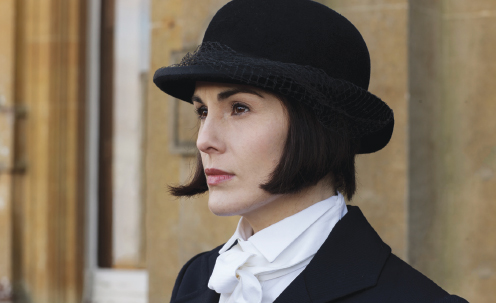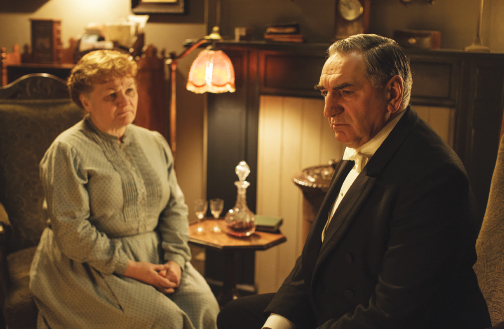
As the series finale of Downton Abbey comes to a close, British Heritage Travel sits down exclusively with its executive producer, Gareth Neame, to learn why he thinks its popularity will endure, how some of the characters changed, and whether there will ever be a movie version of the popular show.
British Heritage Travel: Why do you think Downton Abbey is so popular in the U.S.?
Gareth Neame: The perennial American interest in the British aristocracy, the royal family, the English country house genre, the fashions and all of it. Such a different way of life! People got completely captivated by the writing, the power of the soap opera of it all. In this soap genre, the more you watch it, the more you become hooked.
BHT: Would you then say Downton is the world’s most well-produced, well-acted soap?
GN: If “soap opera” is defined by a group of characters that all inhabit one environment and the story is how they all get on with their lives, Downton is clearly a soap opera.
BHT: The show has brought such a huge audience to PBS. What do you think it’s done for American television in general?
GN: It sounds a bit grandiose, but it’s unquestionably true—it’s the most successful non-US drama series to ever play in America, the most successful British show in America…. I remember being told by people in Hollywood [before it aired here], “Gareth, nobody in the United States will ever be interested.”
To their great credit, Masterpiece Theater has been very supportive of British drama throughout its 40-year history. Now they have a lot more competition. They were literary-focused, with the BBC’s adaptation of books, which is a noble tradition in British drama, but Downton doesn’t check that box at all. It doesn’t follow the formula they usually followed. It isn’t Jane Austen or Dickens or Tolstoy. As much as the great works of literature have these fantastic stories, we have seen them before. Today’s audiences want multiple story lines and characters, and they don’t want to be able to work out where it’s going. Literary drama can’t offer that.
BHT: The show has featured so many great characters. Who would you say has changed the most over the seasons?
GN: They’ve all changed, but some quite drastically, like Edith in the final season. She was already a character whose life changed beyond what she could ever imagine with the setback and the business. Tom Branson started as a young man and marries the boss’ daughter, becomes part of the aristocracy; Mary as a widow with a child. They have all been on pretty big journeys.
BHT: Were there characters that you thought were going to be a minor part of the show and took off and perhaps changed the course of the story?
GN: So many. There was never really an upfront idea to bring Carson and Mrs. Hughes into a relationship. We were responding to the chemistry between the two. Molesley came in as a very minor character. We were responding to what a good actor Kevin Doyle is, so we wrote him up. More recently Violet’s servants, Spratt and her maid, have become big characters.
That is the great thing about series television, rather than a miniseries or a film. With a series, you’re in constant production, so you’re able to respond to what you’re watching. It was very much the chemistry between Jim and Phyllis that made Julian and the producer realize we had to get them married. Another one was Mrs. Patmore. She ended up being a much bigger character because she was so good—a sort of below-stairs Violet. Certain things come along that you didn’t anticipate and have to work around, like Dan Stevens deciding to quit the show.
[caption id="DowntonAbbeysGarethNeame_img1" align="alignleft" width="496"]

NICK BROGGS/CARNIVAL FILM & TELEVISION LTD 2015 FOR MASTERPIECE
BHT: When we last met you told me that was a boon for the show.
GN: Definitely! It was the best thing that could have happened. We had no alternative but to kill the character off. We had Mary getting on with her life—and it gave us so much more dramatic power than a husband and wife with a baby would have done.
BHT: One of the show’s many strong suits is showing romantic relationships between older characters.
GN: Julian has a strong feeling that we only ever depict love affairs and romance exclusively with young people, and it’s mainly sexual love because romantic love is thought to be so outdated and turgid.
The idea that most shows and films say it’s all over once you hit 35 is clearly ridiculous, and it’s a credit to the show that Isobel and Merton have this really beautifully played relationship, and Violet with her Russian count. To find out that she had a past, while she’s dealing with the peccadilloes of her granddaughters; we’re finding out she was going to leave her husband! When she talked about how she nearly eloped and how she was pulled out of the carriage—it was brilliant! I just love how we say, “We all had lives and we got on with it and don’t count us out because we’re older!” Our fans are across every age, but we have a lot of older fans, so they found that very positive.
[caption id="" align="aligncenter" width="634"]

BHT: How would you sum up the show’s legacy?
GN: Downton Abbey took the audience back to a world that they’d perhaps forgotten and did it with 21st-century storytelling: fast-paced with multiple narratives, multiple characters and a mixture of drama, romance and comedy. And as I said, I think it also reminded people how much romantic love, rather than sex, is something audiences around the world have appreciated.
There may be other shows that are revered, but there’s something about ours—not just in the UK and the US, but it’s been in every country around the world, and people seem to get that English humor and the hierarchy of it all—and the subtext. That people never really say what they mean in a scene. It’s always what they don’t say, and somehow, even when it’s dubbed and subtitled around the world, people still understand that nuance.
BHT: Will we never go back to Downton? No movie?
GN: Well, potentially, there could be a movie. There won’t be a TV show, but you might see them in a movie. I can’t guarantee that for now!
BHT: I read that Michelle Dockery (Lady Mary) felt actually sick after her last scene wrapped. How did you feel when the actual production ended?
GN: It was a very strange time because it’s been hugely important for everyone involved. It’s changed the careers and fortunes of the cast. They loved making it. We all collectively thought it was time to bring the show to the end before we started to outstay our welcome. We quit maybe a bit early.
BHT: Did you keep anything from the set as a memento?
GN: That question is only ever asked in America, so I don’t know what it is about that kleptomania. [Laughs] I didn’t because we own the set!





Comments